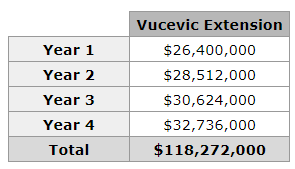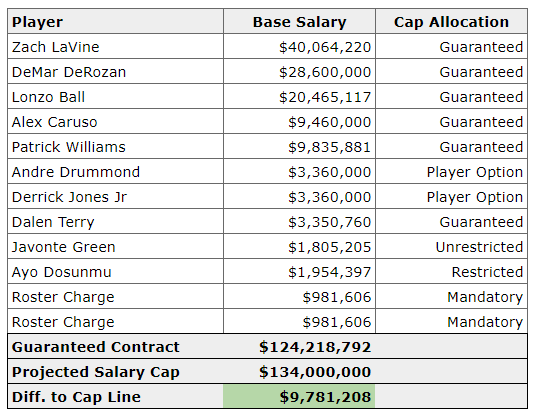© 2026 ALLCITY Network Inc.
All rights reserved.

Nikola Vucevic has picked the perfect time to have a bounceback season.
Vucevic, who is concluding the final year of a 4-year, $100 million deal, has rediscovered his shooting touch, and is posting All-Star level numbers in January: 21 points, 13.6 rebounds and 4.3 assists.
Based on production, Vucevic has earned a new, lengthy extension. But is this something the Bulls should entertain? After all, the franchise remains an oddity, languishing three games below .500.
Nonetheless, the Bulls and Vucevic must decide if their partnership is worth continuing beyond this season. The breadth of outcomes runs deep, so let’s try to make sense of it all.
Can the Bulls and Vucevic agree to an extension?
Vucevic has been tremendous this season, but how many prime years does he reasonably have left?
This is the question Bulls executive Arturas Karnisovas must be pondering in any negotiations with Vucevic and his representatives.
Theoretically speaking, both parties can continue negotiating terms of an extension up until June 30, 2023.
As per provisions within the Collective Bargaining Agreement (CBA), the most the Bulls can offer their center is a 120 percent raise. On an expiring salary of $22 million, the Bulls could pay Vucevic as much as 4-years, $118.3 million.

Compared to his current contract, this figure represent a slight bump in pay for Vucevic. Of course, this assumes the Bulls would be prepared to offer the entire bag.
Given contract negotiations haven’t progressed, it’s fair to assume that neither party is satisfied.
Vucevic, 32, remains a productive player, and likely will continue to be during the first half of a four-year deal. Beyond that, though, paying an ageing center over $60 million dollars as he enters his age-35 and-36 seasons is a dicey proposition.
The Bulls should be reluctant to offer a long-term deal. In turn, Vucevic is unlikely to come to terms on a short-term arrangement.
Such an impasse will force Vucevic into unrestricted free agency. The Bulls and Vucevic can reconvene and agree to a new deal in July.
Alternatively, Vucevic is free to negotiate and sign a deal with a rival team. Should Vucevic be wooed away from Chicago, the Bulls — who paid a significant price to acquire Vucevic two years ago — will lose their starting center for nothing.
Can the Bulls find a replacement for Vucevic in free agency?
As noted above, Vucevic leaving the Bulls during free agency is a real possibility. If this were to occur, the Bulls would quickly need to pivot.
The question is, can they?
Let’s continue to dabble in hypotheticals. Here’s another realistic scenario:
- Vucevic signs elsewhere in free agency, thus removing his cap hold from the salary calculations
- Andre Drummond ($3.4 million) and Derrick Jones Jr. ($3.4 million) opt into the final year of their respective deals
- Bulls retain the rights — and cap holds — of soon-to-be free agents Ayo Dosunmu ($2 million) and Javonte Green ($1.8 million)
- Coby White, Goran Dragic, and any other free agent at the end of the bench (Tony Bradley, Marko Simonovic) leave in free agency (or have their cap holds waived)
If the above scenario were to play out, the Bulls would enter free agency with $9.8 million in cap space.

Is it possible to find a replacement-level center in free agency with this amount of space?
Yes, most likely.
As an example, Isaiah Hartenstein signed a 2-year, $16 million deal with the New York Knicks last offseason.
Is a Hartenstein-level player a suitable replacement for someone as integral as Vucevic?
No, absolutely not.
Put another way, if the Bulls are outbid by another buyer, one who offers Vucevic more years and dollars, they have no reasonable means through free agency to overcome the loss of Vucevic.
Can the Bulls open up more cap space?
Theoretically, yes.
The previous scenario assumed Drummond and Jones Jr. would opt into the final year of their contracts. The backup bigs have player options, thus they control their own destiny. However, if both chose to decline their options, the Bulls would create approx. $14.5 million in cap space. Still not a huge number. No stars are signing for that amount. But a good starter could be had.
As an example, let’s posit San Antonio Spurs center Jakob Poeltl could be lured to Chicago for a deal that starts at $14 million in year one. Signing Poeltl would be a good outcome, but can he replace Vucevic?
Stylistically, no. Poeltl offers far more on defense, though is a problematic fit on offense. His addition would be superior to anything the Bulls could acquire in the previous scenario above. It’s also not a perfect solution.
Of course, there are also scenarios where the Bulls opt to operate above the cap (as they have done the past two seasons). If this were to occur, the Bulls would only have access to the Non-Taxpayer Mid-Level Exception (NTMLE).
Should current salary cap projections remain ($134 million), this exception allows the Bulls to offer $11.4 million in the first year of a deal. Similarly to the above, that’s nowhere near enough money to entice a real, credible center to fill the void left by Vucevic.
Should the Bulls trade Vucevic at the deadline?
In light of the above scenarios, the headline to this section raises a valid question.
In order to find a suitable answer, the Bulls need to consider the following:
- Does the value of any incoming asset(s) in a trade outweigh any risks associated with losing Vucevic in the offseason?
- Do these incoming asset(s) provide the Bulls enough long-term value in order to justify moving away from continuity of the current collective of players?
As an example, let’s assume the Brooklyn Nets come calling, offering up Joe Harris, one of the best shooters in all of basketball, for Vucevic.
Harris, 32, is owed $19.9 million next season. By making this trade, the Bulls are effectively swapping out an expiring deal (Vucevic) for a guaranteed contract (Harris) and, in doing so, ensuring they net something of substance for Vucevic at the trade deadline.
Purely from an asset management perspective, using Vucevic and his expiring deal to acquire another player — an option that doesn’t exist in the offseason — is a logical outcome.
What about when considering other real and valid factors?
Harris, a career 43.5 percent shooter from three, would greatly help the Bulls, who rank 30th in 3-point attempts. Unfortunately, acquiring Harris also pushes the team over the cap line.
As noted previously, if the Bulls operate above the cap, they will only have access to the NTMLE. Finding a good, starting-caliber center with this exception is a difficult task. And if they don’t, though Harris may be marksman from distance, prioritising him in a trade inadvertently creates a dearth at center.
Rather than trading a big man (Vucevic) for a wing (Harris), the Bulls could opt for a like-for-like swap. Sounds good in theory. But, again, this will force the Bulls to operate above the cap and, like before, only the NTMLE will be available to use to fill out the roster’s biggest shortcomings.
Starting to sense a theme?
Reality is, trading Vucevic may solve one problem, though it will create another. It’s an imperfect proposition.
Because of this, one could easily justify keeping Vucevic beyond the deadline in an attempt to keep the core together for one last postseason run. Furthermore, if the Bulls are confident they can re-sign Vucevic in the offseason, then why deal him? And if he walks, at least that provides an opportunity to shift, clear cap space, and retool.
Unless the Bulls can yield a haul for Vucevic, trading him at the deadline doesn’t make much sense.
What should the Bulls do?
Despite a maddening loss to the Indiana Pacers, the Bulls remain top-10 in net rating over their last 15 games. Assuming this trend holds, retaining Vucevic is the most favourable outcome for the Bulls.
Doing so ensures keeps one their most important players away from free agency. Furthermore, they regain control of his contract status — his deal could be useful in future trade considerations. And, as noted above, other possible transactional routes are far from enticing.
As for Vucevic, he receives one last big pay day, for a him team which prioritises his role and position as a starter.
Negotiation talks will focus on years, not dollars. As such, a four-year deal that will pay the center through his age-36 season is a non-starter. Ideally, the Bulls would cap the deal at two years. This makes little sense for Vucevic, who could fetch an equivalent deal with ease in free agency. Both parties need to meet in the middle. A three-year deal, that which is only partially guaranteed, is a fair compromise.
The deal: 3-years, $70 million
It seems excessively high, but hear me out.
On his current deal, Vucevic earns average annual value (AAV) of $25 million per season. In the above, fictitious scenario, his AAV falls to $23.3 million over the life of the deal. Furthermore, as a percentage of the cap, the first year of the proposed deal would consume less cap space than his current deal.

Finally, as noted above, year three of the deal is only partially guaranteed. Let’s assume the Bulls decline his final season, and only pay the guaranteed portion (ideally $5-8 million). In this scenario, the net impact to the team is $50 million over two years. When comparing the total that Vucevic is guaranteed to his current contract, the AAV ($25 million) is identical.
This is a fair outcome for both sides.
Get Chicago's Best Sports Content In Your Inbox!Become a smarter Chicago sports fan with the latest game recaps, analysis and exclusive content from CHGO’s writers and podcasters!
Just drop your email below!
Comments
Share your thoughts
Join the conversation



